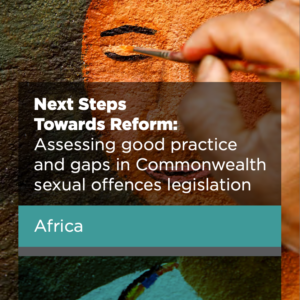Kenya’s sexual offences laws are in the Penal Code (PC) and the Sexual Offences Act 2006 (SOA). The Evidence Act (as amended) (EA) contains the evidentiary rules for all criminal offences, including sexual offences.
In 2006, major reforms were made to sexual offences by the SOA, introducing a number of positive changes. Many of these are not assessed in this research, but include important procedural safeguards for complainants, allowing evidence of the impact of the crime to be considered in sentencing, treating the abuse of a position of trust or authority to commit sexual assault as an aggravating factor in sentencing, and introducing a range of offences of sexual exploitation of children. Several positive reforms that are assessed in this report were also made by the SOA, including adopting a good practice definition of ‘consent’ and criminalising non-consensual sexual penetration by any body part and by objects. The age of consent to sexual activity is 18 years for both boys and girls engaged in opposite-sex sexual activity.
However, other areas of sexual offences laws assessed in this report do not meet good practice standards and are not human rights compliant. For example, Kenya criminalises consensual same-sex sexual activity between men under the PC. A challenge to the criminalising provisions was unsuccessful in 2019 and is currently under appeal. Laws that criminalise consensual same-sex sexual activity should be repealed and all non-consensual sexual acts, including anal ‘rape’, should be included in the general sexual assault provisions, such as ‘rape’ and ‘sexual assault’, as well as in child sexual offences. All of these crimes should be gender-neutral.
Further, many of the sexual assault provisions do not meet good practice. For example, rape and sexual assault in marriage are not expressly criminalised and the law does not specify that evidence of resistance to the assault, such as physical injuries to the body, is not necessary to prove that sexual activity took place without consent. The PC criminalises consensual sexual activity with an intellectually disabled person, regardless of consent and uses derogatory terms such as ‘idiots and imbeciles’ to refer to such persons. There are no specific close-in-age defences to protect young people from being prosecuted for consensual sexual activity with their peers.
Kenya is a state party to some relevant international and regional human rights treaties, including the Convention on the Elimination of All Forms of Discrimination against Women, Convention on the Rights of the Child, Convention on the Rights of Persons with Disabilities and International Covenant on Civil and Political Rights. It has not joined the Convention against Torture and Other Cruel, Inhuman or Degrading Treatment or Punishment. Kenya is also a party to the African Charter on Human and Peoples’ Rights and the Protocol to the African Charter on Human and Peoples’ Rights on the Rights of Women in Africa (Maputo Protocol).
Read more about the criminalisation of LGBT people in Kenya.
The full assessment of Kenya is also available here.



